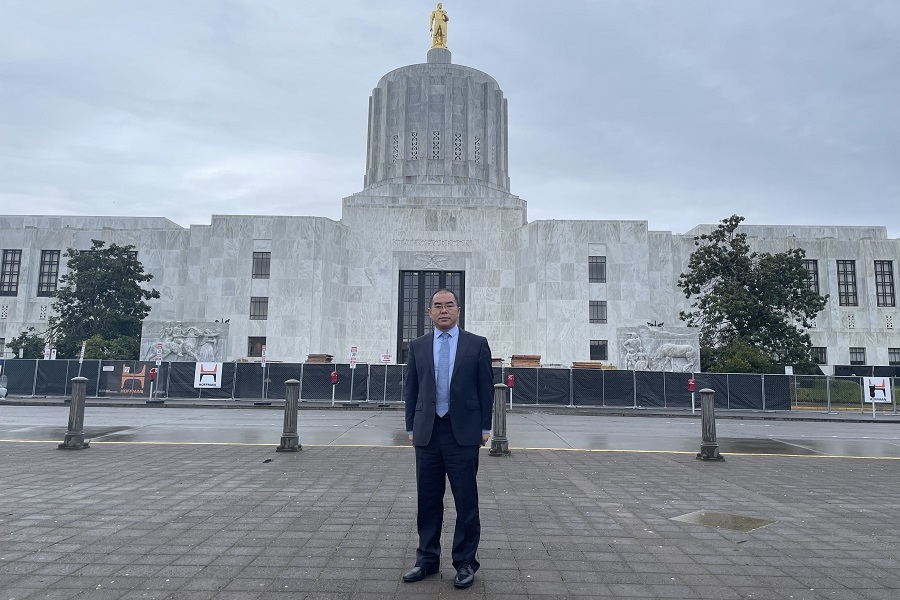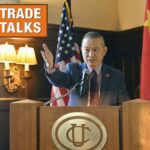Acting Consul General Pan Qingjiang discusses how the United States’ ongoing trade war — and economic sanctions against Russia — add uncertainty to Oregon and China’s economic partnership.
Pan Qingjiang says economic warfare would have dire consequences to Oregon’s economy.
The acting consul general of the Chinese consulate general in San Francisco, spoke with Oregon Business about the United States’ economic sanctions on Russia, which Chinese officials have called “outrageous” and “dangerous.” We also talked about the role Oregon can play in the relationship between the United States and China in the future.
During his career in the Ministry of Foreign Affairs, Pan served in the Department of Asian Affairs, the Department of International Organizations and Conferences and the Department of North American and Oceanian Affairs. He has worked in Chinese embassies and consulates in South Korea, Sweden, Nauru, Pakistan, Zambia and other countries. Prior to Deputy Consul General in San Francisco, he served as deputy general manager of the China Harbour Engineering Corporation.
Oregon is ranked 18 of the biggest exporters in the country, despite ranking 27 in population — making it especially dependent on foreign trade. According to a 2018 report from Business Roundtable, one in five jobs in Oregon are connected to trade. China is Oregon’s largest export partner, accounting for more than 20% of all export profits, according to the Office of the U.S. Trade Representative.
Interview has been edited for length and clarity.
You have served diplomatically to build China’s relationship with different countries across the world. What makes Oregon and China’s relationship unique?
It is my belief that what makes the Oregon-China relationship unique is because of the amount of mutual support from our two sides. For example, both governmental and non-governmental [actors] work to support the bilateral relationship. That is something with which I am very impressed.
Secondly, there are a lot of common interests, so they share a lot of potential for cooperation, especially economically on trade. Last year the volume of trade between both sides reached $13 billion, which is a vivid example of this relationship.
I believe that the trade volume will grow higher than $13 billion. Currently, tariffs are the biggest barrier to that growth.
The Biden Administration has not removed the previous administration’s tariffs with China, and talks have reportedly been unproductive. What are the tariffs that specifically hold Oregon trade with China back?
Before the new administration came into office, I think people put a lot of expectations of change in China policy for the better. Unfortunately, many of these wrong policies are being continued. We are even seeing more restrictions placed on our cooperation. I would need my colleagues’ advice, though, if we were to advocate for the removal of a specific item.
China and the United States stand to benefit and prosper from cooperation. We believe this could be energy and technology and decarbonization.
Many elites do not like to see the rise of China and so they play up the threat, but we are not a threat to any country. We exist to meet our people’s expectation of living a better life. There are currently 360 acts on the congressional agenda, and many of those acts play up the China threat or advocate for some sort of ‘decoupling’ from China.
If these acts are passed we believe this would have adverse effects on many U.S. states.
It is our official position that we are opposed to any trade war. We believe it will do no good for either side, and that we should work for a timely removal of these tariff barriers. We should seek to live peacefully with each other and avoid conflict with each other. It is our position that sanctions are not acceptable as they do not resolve a conflict. It will disrupt the already fragile world economy.
How can Oregon and China’s relationship continue to grow and make U.S. politicians realize this?
On the climate change issue, we share a lot in common. It is an area where Oregon has made a lot of investment and has really done a good job. That is an important area of our cooperation, both for our economic interests and for the world.
We are willing to work with Oregon scientists as well as similarly positioned states like California and Washington. During my trip to Oregon someone suggested we hold a joint seminar and invite those three states since your three states also have some joint programs.
I think this is a good idea, and I think the consulate is ready to help and coordinate. More seminars will be held and planned. We hope both sides will step up efforts in this area so that it can bear even more fruit.
Most importantly, I think Oregon and China should work on increasing communication among different circles. It is crucial to make exchanges to advance science and technology and we have a lot of things to do in this area.
There’s some wrong images of China and Chinese people in this country and it really is a pity. I think it is because of a lack of communication. We work tirelessly to shift this image.
What is it about China you hope more Americans would realize?
China is a peaceful country and we follow a path of peaceful development. Even as China grows it will not seek hegemony. It is written in our constitution. The Chinese Communist Party has the goal of better development and a better life for their people.
We believe that we are all living in a small global village with a shared future and we face shared challenges: The recession of the global economy, terrorism, climate change and the current covid crisis.
The world needs cooperation, especially among big, major countries to address these challenges. China is not a threat at all, but an opportunity. China is a big market. We have 1.4 billion people. With the further development of China it will open up even more opportunities.
It is the right of every person in every country to live and have their lives. The economic repression of any country is not fair or acceptable.
The United States’ economic repression of Russia is a direct result of military aggression. If sanctions are never acceptable, when is military force and violence acceptable?
We will always pursue a defensive policy. We are opposed to war and we are a peace-loving country. We will only use force if our sovereignty is threatened or if our core interests are destroyed.
We will never start a use of force. We are opposed to that.
We hope that the parties involved will sit down and have peace talks to achieve a final solution to this problem.
To subscribe to Oregon Business, click here.








